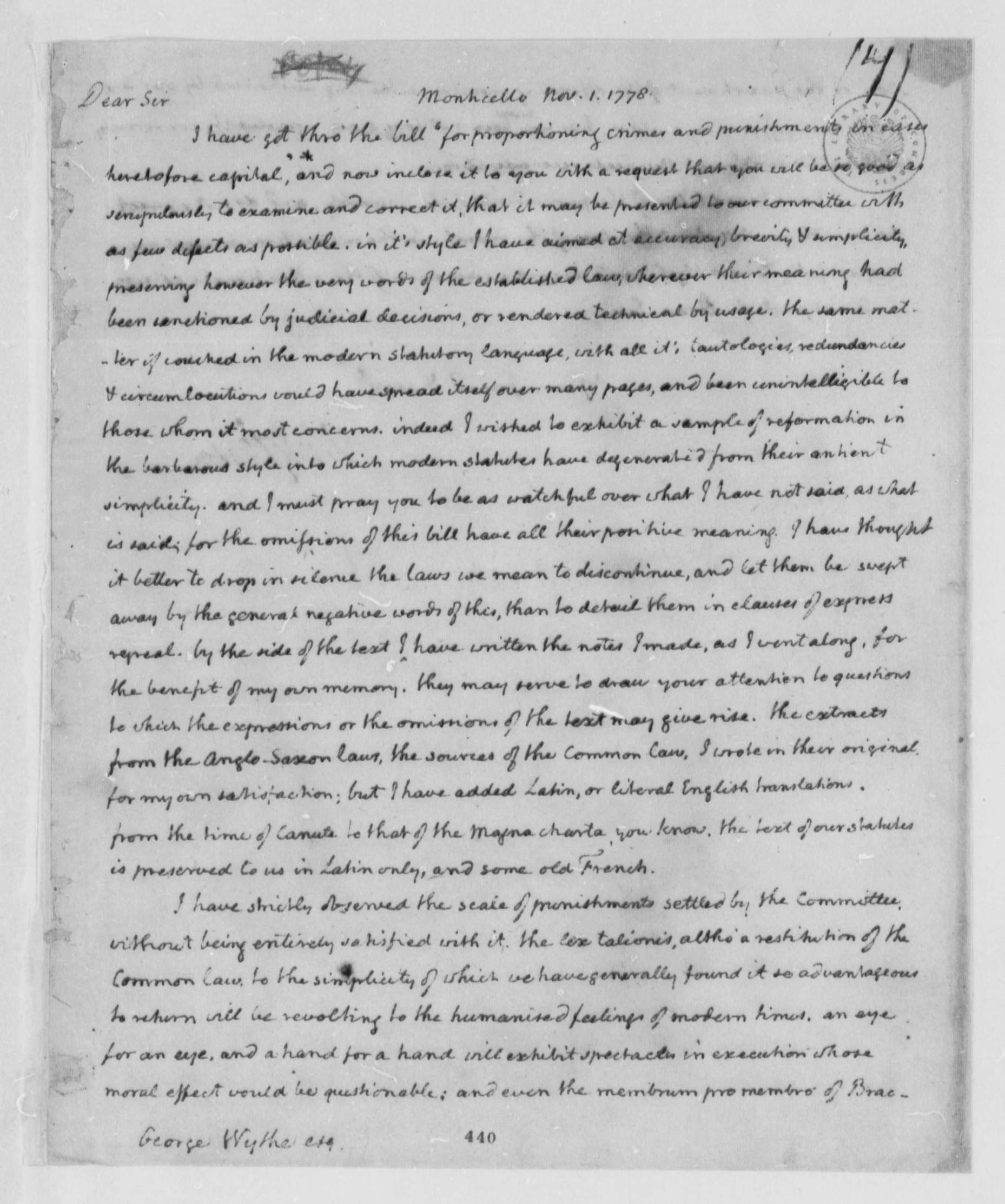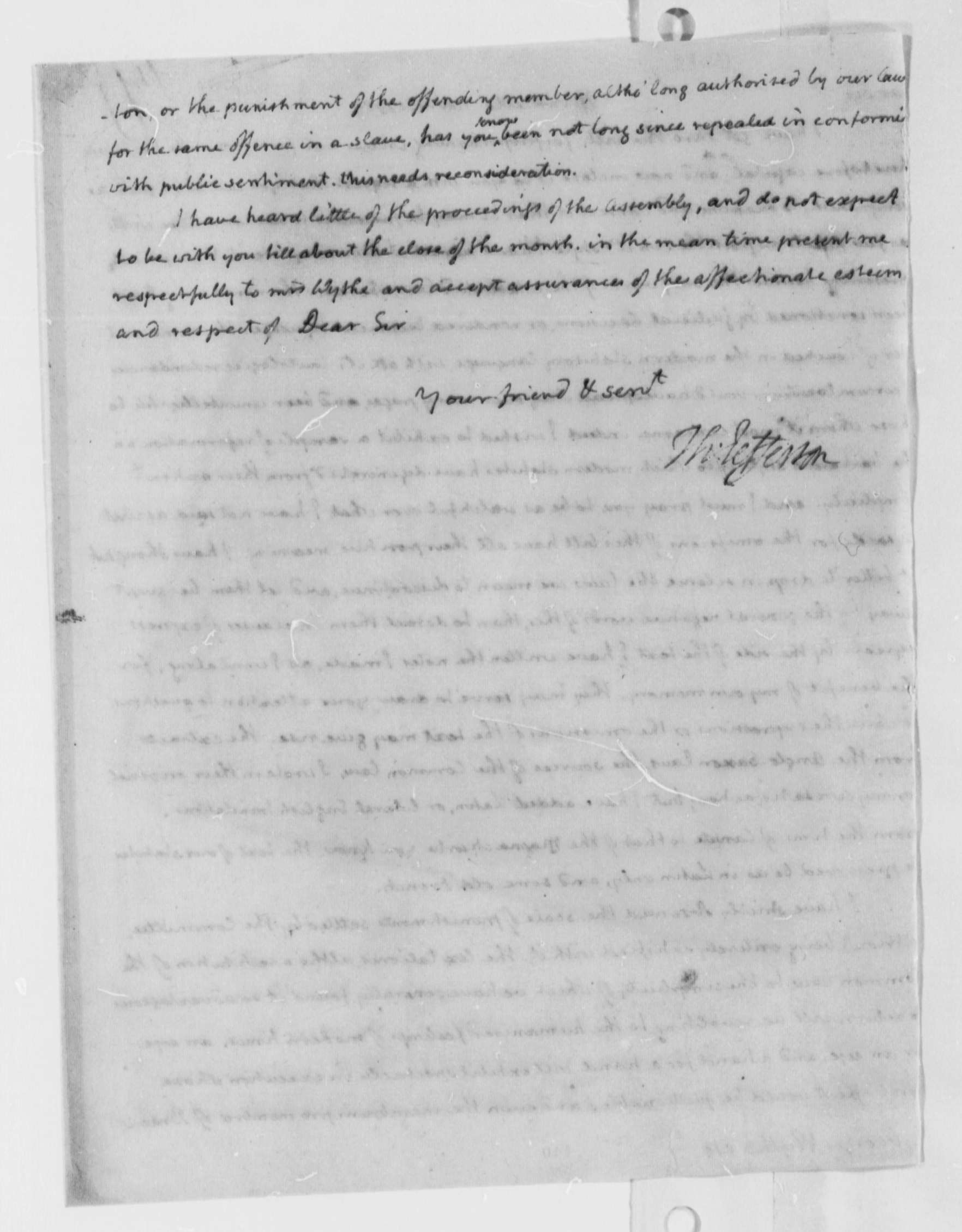Thomas Jefferson to Wythe, 1 November 1778
Thomas Jefferson asks George Wythe to look over a bill he wrote concerning the balance between a crime and its punishments. Jefferson wishes the bill to be accurate, brief, and simple so that information is not lost and so it is able to be read by those that it concerns the most. He is asking Wythe to look over the bill so that it can be presented with as few errors as possible. The excerpts of the Anglo-Saxon laws in the bill appear in their original form and Latin. Jefferson mentions that the forms of punishment that are lex talionis, or "eye for an eye" punishments where a perpetrator is injured in a similar way to his transgression, need to be looked at for the morality of such punishments.

"Thomas Jefferson to Wythe, 1 November 1778, pg 1." Image from the Library of Congress, The Thomas Jefferson Papers.
Contents
Letter text
Page 1
Monticello Nov. 1. 1778.
Dear Sir
I have got thro’ the bill for proportioning crimes and punishments in cases heretofore capital,' and now inclose it to you with a request that you will be so good as scrupulously to examine and correct it, that it may be presented to our committee with as few defects as possible. in it’s style I have aimed at accuracy, brevity, & simplicity, preserving however the very words of the established law, wherever their meaning had been sanctioned by judicial decisions, or rendered technical by usage. The same matter if couched in the modern statutory language, with all it’s tautologies, redundancies, & circumlocutions would have spread itself over many pages, and been unintelligible to those whom it most concerns. indeed I wished to exhibit a sample of reformation in the barbarous style into which modern statutes have degenerated from their antient simplicity. and I must pray you to be as watchful over what I have not said as what is said; for the omissions of this bill have all their positive meaning. I have thought it better to drop in silence the laws we mean to discontinue, and let them be swept away by the general negative words of this, than to detail them in clauses of express repeal. By the side of the text I have written the notes I made, as I went along, for the benefit of my own memory. They may serve to draw your attention to questions to which the expressions or the omissions of the text may give rise. The extracts from the Anglo-Saxon laws, the sources of the Common law, I wrote in their original for my own satisfaction; but I have added Latin, or literal English translation from the time of Canute to that of the Magna charta, you know, the text of our statutes is preserved to us in Latin only, and some old French.
I have strictly observed the scale of punishments settled by the Committee, without being entirely satisfied with it. The lex talionis , altho’ a restitution of the Common law, to the simplicity of which we have generally found it so advantageous to return will be revolting to the humanised feelings of modern times. an eye for an eye, and a hand for a hand will exhibit spectacles in execution whose moral effect would be questionable; and even the membrum pro membro of Bracton
George Wythe esq.
Page 2

"Thomas Jefferson to Wythe, 1 November 1778, pg 2." Image from the Library of Congress, The Thomas Jefferson Papers.
-ton, or the punishment of the offending member, altho’ long authorised by our law for the same offence in a slave, has you know been not long since repealed in conformity with public sentiment. This needs reconsideration.
I have heard little of the proceedings of the Assembly, and do not expect to be with you till about the close of the month. in the mean time present me respectfully to mrs Wythe and accept assurances of the affectionate esteem and respect of Dear Sir
Your friend & servt
Th: Jefferson